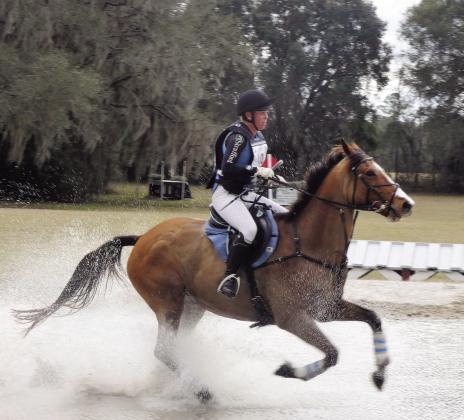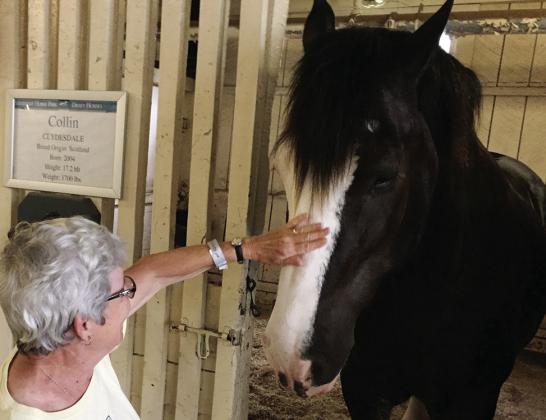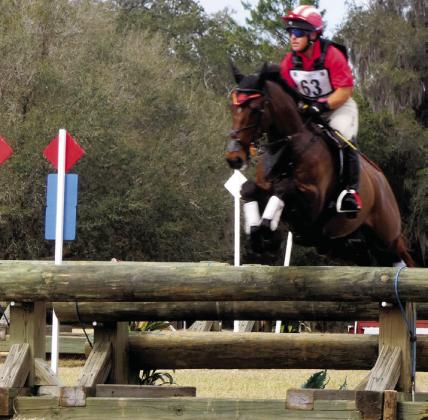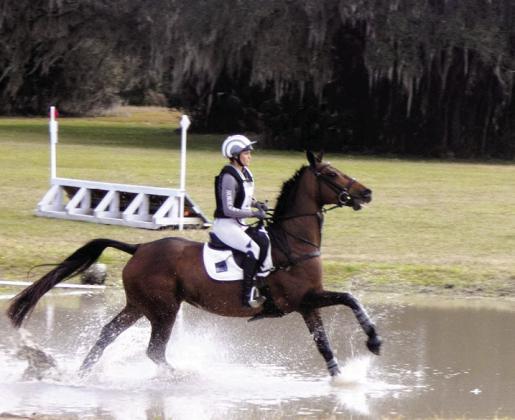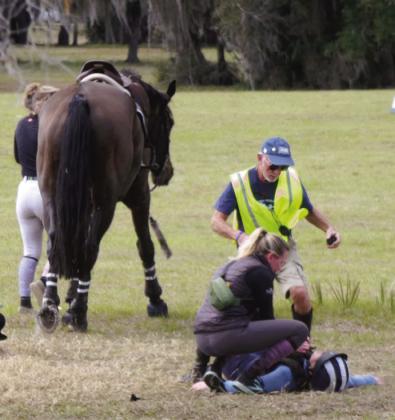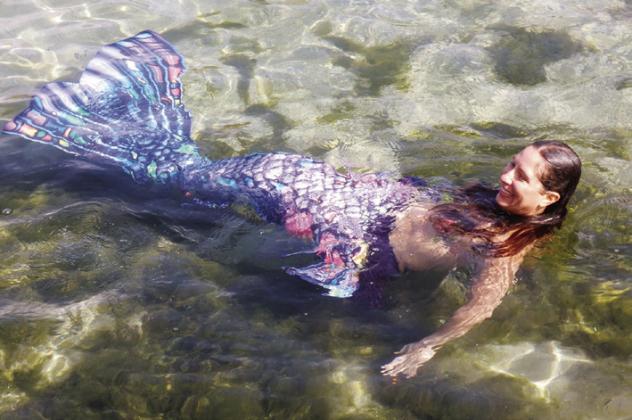by LeMoyne Mercer
“MMM,” I SAID. “SMELLS LIKE HORSES.”
“Yes,” said Shirley, “isn’t it wonderful?”
Long-time readers of HLN are aware that Shirley is a horsey person. Like many, she became an accomplished equestrian when photographers roamed the neighborhoods with ponies and kid-sized Western hats. Sometimes even a vest. For a couple bucks, mothers could get black and white prints of Dick or Jane pretending to be Roy or Dale.
Now, “accomplished equestrian” is what we professional writers call hyperbole. You might think of it as a load of hay that has been filtered through a horse. There was a gap of several decades between Shirley pretending to be Dale and her next time anywhere near a creature of the equine persuasion. That occasion was a trip to Yellowstone when we were joined by our daughter Sarah and her kids, Nick and Lizzy. We went on a chuck wagon ride with camp dinner. While Cookie was grilling our steaks, Lizzy insisted on going to see the horsies at the hitching rail and coerced Shirley into going along. Lizzy showed Mimi how to pet them on their velvety smooth noses. Mimi was captivated.
So, when I proposed a visit to the Kentucky Horse Park near Lexington, she was amenable. In addition to seeing and learning about various breeds, Shirley had a chance to approach them closely. Even the huge Belgians and Clydesdales began to seem less intimidating to a person of diminutive stature. Soon, she was on a first-name basis with several.
In recent years, when we winter in Florida, we reserve our regular campsite at Alexander Springs during the Winter Horse Trials just a few miles away. There are events in dressage, show jumping, and cross country racing for horses and riders at various skill levels. It is obviously not fair to have novices competing against seasoned riders on highly- trained mounts. It should be noted, in addition, that athletic events have become controversial when biological males compete against smaller, less powerful biological females. That is not an issue in the equestrian world because of the skill rankings. That includes the horses as well. Does not matter if they are stallion, mare, or gelding. All that matters is whether you can do it or not.
For that matter, equestrians seem much more interested in improving their own performance than in where they rank against others. The life lesson here is to compare yourself to who you were yesterday rather than to who somebody else is today.
At the show jumping ring, I was standing next to the father of one rider. After her round, she rode over. “He was a little jiggy on that first jump.” he said. “Was that his fault or yours?”
“My fault,” she said. “I encouraged him a little too much.”
I was impressed that she took responsibility. There is nothing to be learned from refusing to face the truth. No honor in it either.
One of the benefits of being within a just a few feet of the events is the chance to observe the various kinds of “encouraging” as it takes places. Some riders have ongoing conversations with their mounts. Clear a double oxer and they’ll pat the horse’s neck and say, “Good boy! Good boy!” Some keep up a constant chatter. Like the rest of us, horses appreciate being appreciated.
Show jumping is classically elegant with riders with specified attire and horses with braided manes or bonnets that hold their ears erect. Cross country, on the other hand, is all about power, endurance, and courage. The length of the course and the difficulty of the jumps vary with the skill classification. Spectators are allowed to walk out on the course as long as they don’t interfere with the race by getting run over by galloping horses. Fortunately, from quite a distance, you can hear the huffing and puffing, jangling and squeaking of bridles and saddle leather, and approaching hoof beats.
One year, on the way to our favorite viewing position on the course, we met a rider. Well, former rider. He was on foot and soaking wet. At the water jump, his horse threw on the brakes at the last second and dumped him in. Then continued the course without him.
The water jump is our favorite because it is dramatic and challenging. From beneath the branches of a live oak dripping with Spanish moss, we can watch as riders approach from various directions depending on the skill classification. Usually, they are required to clear a jump at the edge of the pond, land in the water, splash across, and then clear another jump when exiting. Last year, a horse caught his rear hooves on the exit jump, took a spectacular fall, landing on his rider. Emergency crews arrived within seconds to restrain the horse so that his thrashing about didn’t further injure his rider. An ambulance took her away. Jack, the horse, was able to walk to his trailer.
Essentially the same thing happened this year with the more favorable results of no serious harm to the rider, another young woman. She was able to walk her mount back to the trailer. It is impossible to exaggerate how much courage it takes to compete in cross country. At this very course, a rider died last year. The response to that was a redesign of the course and the creation of more forgiving jumps. In show jumping, if the horse kicks a bar, the bar goes down. In cross country, if a horse kicks a bar, the horse goes down.
As in the case of that wet rider, sometimes a horse seems to say, “You want me to go where and do what! Are you crazy?” There are always instances in which the horse approaches a jump and decides not to. Sometimes the rider can back him up and encourage him to have another go at it. Confident riders can inspire confidence in their mounts. Sometimes, the rider conveys his own apprehension to the horse through body language or tone of voice. Two such refusals result in withdrawal from the event. Makes me wonder how many times a horse or rider can get a little jiggy before looking for another line of work or “to spend more time with the family” as they say in HR.
Cross country requires courage on the part of both horse and rider, but the only way to measure courage is by willingness to confront a challenge. Still, some horses are sold on the basis of their demonstrated courage. Checking the schedule of events posted in the barn, we saw a poster offering a horse for sale.
$50K 16 hands An extensive record through the 2* level Excellent on the jump, easy on the flat, and brave cross country “Get back on that horse” is proverbial because how you respond to failure influences almost every aspect of life. It is not how many times you fall down but how many times you get up again that matters.
On Mermaids Monday at Alexander Springs after the horse trials, Shirley and I got to chatting with a New Hampshire woman of a certain age. She admired the mermaids but said she had never learned to swim because, as a child, she had nearly drowned. She turned down numerous offers for swimming lessons from people with pools. She had failed big time early on and never got back on that horse. I shared with her the “wisdom” of my grandmother who said you should never learn to swim. If you can’t swim, you’ll stay away from the water and you’ll never drown. She agreed with Grandma.
In contrast, Shirley and I knew a woman who wanted to become a registered nurse. Unfortunately, she was not very good at stuff like chemistry, anatomy, or physiology. After she failed out of the program, she worked to become a licensed practical nurse. The academic requirements were less rigorous and she was able to graduate and find employment. The knowledge she gained on the job and her renewed determination eventually made it possible to complete the program and become an RN. Some are guided by the motto “If first you don’t succeed, try, try again.” Others tell themselves, “Give it up, you fool, it can’t be done.”
Perhaps if you are old enough to remember photographers with ponies, you also remember strapping steel roller skates onto your shoes and having a go on the sidewalk. At first, we spend most of our time with our rear ends in contact with the concrete. But a highly motivated kid is not permanently deterred by a few bruises and scrapes. Learning to skate was important. For a kid. How many adults do you know who would be willing to bust their keesters a few hundred times? We all do cost-benefit analysis in our heads every day. Some things just seem to be worth the potential risk, but we all have to draw the line for ourselves. Sure, getting eaten by a shark is a possibility, but surfing is just so cool! Developing courage, determination, and perseverance can pay huge dividends in just about any endeavor. The Duke of Wellington famously said that the Battle of Waterloo was won on the playing fields of Eton.
We become stronger in many ways when we get back on that horse—especially when it is not just a walk in the park.
LeMoyne Mercer is the travel editor for Healthy Living News.
You might want to see more of his stories and photos at AnotherWalkinthePark.blogspot.com. ✲

